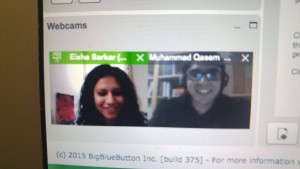I joined Pax Populi in October 2015 to teach English to Afghan students. Kirthi Jayakumar, Pax Populi’s regional coordinator, connected Jami and me with an email to coordinate our schedules. In response, I sent him a polite, “How are you, Jami?†He replied, “I am fine and happy.†His answer made me smile. He then asked me if we could become friends on Facebook. I said, “Yes.†A person with a mind as curious as mine will seldom be satisfied with browsing profiles.
And so Jami and I chatted on Facebook:
Eisha: Isn’t Jami a poet’s name?
Jami: Yes it is.
Eisha: If you don’t mind, may I ask you what your native tongue is?
Jami: Dari Eisha: Do you know any Farsi? I am asking because you’re from Herat.
Jami: Yes, my Farsi is as good as my Dari. In order to figure how proficient he was in English, I asked Jami to send me his brief profile.
What I got were a few well-written paragraphs. I thought, “Why does he need English classes?â€

We chatted even more. By the time Kirthi introduced us formally, we knew about each other’s educational, professional and cultural backgrounds. During our first formal session at Pax Populi Academy, we talked about ourselves, our families and our countries.
We discovered that we share our love for horses, travel, peace, literature, poetry, music, education and films. “You don’t sound like you’re a non-native English-speaker,†he noted. I responded, “Four generations in my family have been speaking English. The English landed in Bengal in the late 1700s. We’ve had plenty of time to learn the language.†He laughed. Jami shared his experiences of travelling in India in 2013, of how his English improved by communicating with English-speaking Indians in Bangalore (Bengaluru now) and Delhi.
Since he works as a translator in Herat, I asked him to share with me one of his Dari-to-English translations. He sent me one he wrote in college: A portion from the famed Persian poem about two lovers, Laila and Majnu. He read it aloud in his American-accented English. Finally, I asked him why he wanted to take up such a course, for he was proficient in English and he could get into writing, publishing or blogging. He was thrilled but said that he knew his limitations and wanted to work on his vocabulary. “I don’t know too many big words. I want to be able to use big, complex words.†Unsure at first, I threw caution to the wind and told him what I tell my first-year students of journalism and communication studies in India, “You must KISS.â€
He was perplexed. “Excuse me?â€
I typed out the letters on the academy site’s chat window, “KISS: Keep It Simple, Stupid.â€
Laughter.
And then he said, “Oh my god, I would never have guessed! Keep It Simple, Stupid. I am going to remember this KISS forever!â€
 Eisha Sarkar is a writer by profession and an explorer by nature. Science is her passion and art is her way of connecting with people. When not writing, she lectures graduate students at universities and colleges in Vadodara and Mumbai on the ways of the media or travels to observe, with keen interest, people of various cultures and tribes. She has worked with organisations such as The Times of India Group, The Maharaja Sayajirao University of Baroda, UNICEF and National Institute of Design in India and Infinito Group in Australia as writer, educator, communications manager and designer. She has written and co-authored books published by India Guide, Westland and Typeshype and is currently filming a documentary on Sakhi, a sanitary napkin-making initiative founded by social entrepreneur, Swati Bedekar. Aiding disadvantaged groups is something she is passionate about and has been working on for over 15 years, from teaching English to domestic servants in Mumbai, to profiling blind photographers and disabled artists in the mainstream media to teaching English to refugees and asylum seekers from Iran and Iraq in Brisbane. Since October 2015, she has been a tutor with Pax Populi Academy and loves the experience.
Eisha Sarkar is a writer by profession and an explorer by nature. Science is her passion and art is her way of connecting with people. When not writing, she lectures graduate students at universities and colleges in Vadodara and Mumbai on the ways of the media or travels to observe, with keen interest, people of various cultures and tribes. She has worked with organisations such as The Times of India Group, The Maharaja Sayajirao University of Baroda, UNICEF and National Institute of Design in India and Infinito Group in Australia as writer, educator, communications manager and designer. She has written and co-authored books published by India Guide, Westland and Typeshype and is currently filming a documentary on Sakhi, a sanitary napkin-making initiative founded by social entrepreneur, Swati Bedekar. Aiding disadvantaged groups is something she is passionate about and has been working on for over 15 years, from teaching English to domestic servants in Mumbai, to profiling blind photographers and disabled artists in the mainstream media to teaching English to refugees and asylum seekers from Iran and Iraq in Brisbane. Since October 2015, she has been a tutor with Pax Populi Academy and loves the experience.